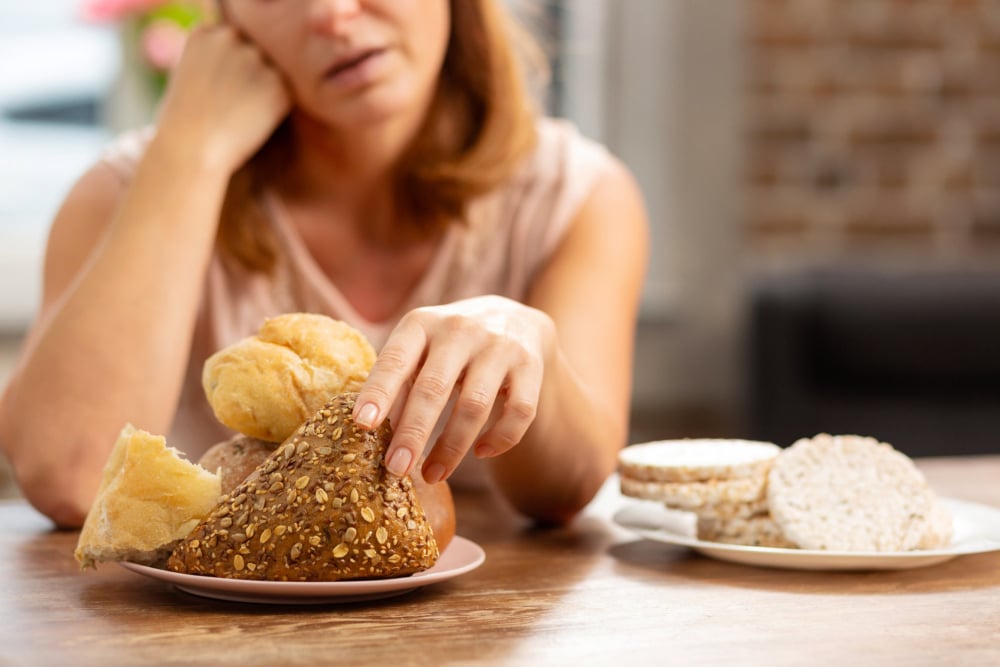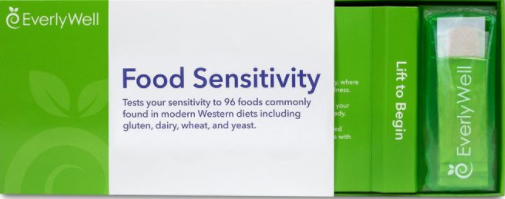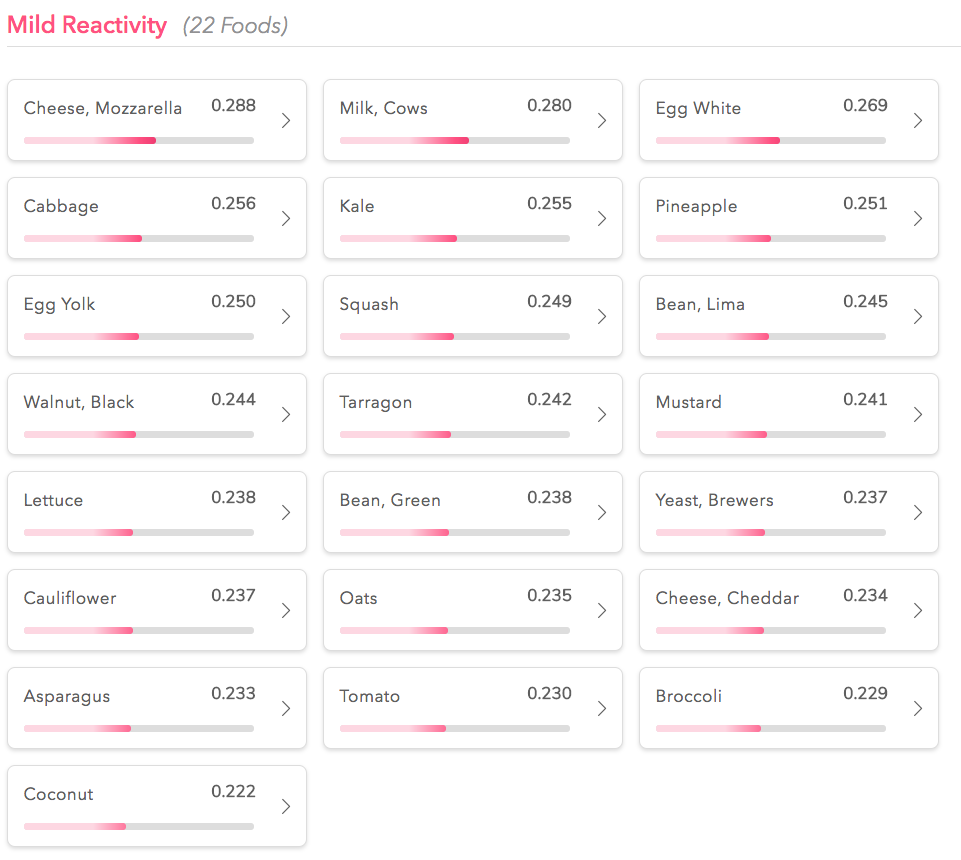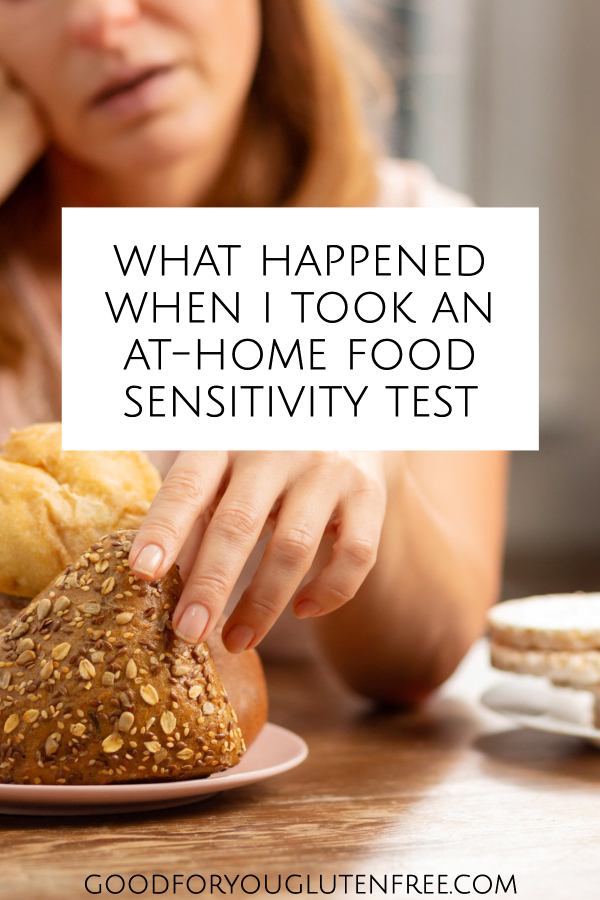
This post about my Everlywell Food Sensitivity Test results includes affiliate links. Please see my disclosures.
Food sensitivities are all the rage, and people are eager to understand what is happening inside them.
Is it gluten? Dairy? Or some other food that is making and keeping them sick?
One company, Everlywell, has done a great job tapping into people’s curiosity to know what foods might make them sick.
But is the test valid?
And what’s it like to take an Everlywell food sensitivity test?
Let’s discuss this in this article.
About Everlywell Food Sensitivity Test
The Everlywell food sensitivity test is an at-home test that measures your body’s immune response to 96 foods, offering those that take the test a little guidance into what foods might be wreaking havoc in their bodies.
Please note that food sensitivity tests for IgG reactivity to foods and does not test for celiac disease.
Read this article to learn how to get tested for celiac disease. Remember, celiac disease is an autoimmune disease, not food sensitivity.
Additionally, please keep in mind that food sensitivity is not a food allergy. Again, having an “allergy” to a specific food (or an IgE antibody test) is a completely different test.
To take the Everlywell food sensitivity test, you have to draw your own blood via a simple finger prick. Once you prick your finger, you then drip drops of your blood into designated circles and then send the blood sample back to Everlywell for analysis.

The test looks for IgG reactivity to certain foods and can help guide you through an elimination diet (more on that in a bit).
**You can order a food sensitivity test of your own at Everlywell.com + use the code GOODFORYOU10 for 10 percent off.**
Are Food Sensitivity Tests Accurate?
Many experts believe food sensitivity tests are quite useful in understanding if specific foods are making a person sick. Foods that cause high reactivity in a person should be avoided through a controlled and purposeful elimination diet.
There is a lot of research behind the validity of food sensitivity testing, but with anything, you can find a study to showcase the pros just as easily as you can find a study to showcase the cons.
One such con is that some experts believe food sensitivity tests only pick up foods that you consume most. Therefore a high IgG reactivity means that you are actually eating that food and may not be intolerant to it.
The truth is, if a food sensitivity test comes back with a laundry list of foods to avoid, it’s more likely than not that you are suffering from a leaky gut. All foods you’re eating are leaking into your bloodstream and being picked up by the blood test.
The best way to approach food sensitivity testing is first to work hard to heal your gut, which you can do via my free 7-day heal your gut challenge, then take the Everlywell food sensitivity test and see what foods are still leaking out into your bloodstream once you know your gut is sealed.
My Test Results
Everlywell makes it easy to test yourself for food sensitivity.
I got the results of my test via email within five days of sending my completed test kit back. The results were displayed on a beautiful dashboard on the Everlywell site.
I opened the results with trepidation, as I, like many of you, was praying things like chocolate and rice didn’t show up at the top of my reactivity list.
I was pleasantly surprised by the results. And I feel lucky to have had such a positive view of my just how far I had come to healing my gut in the years following my celiac disease diagnosis.
The test found that no foods cause high reactivity for me. Interesting, right?
Many of you might think gluten or wheat would have been detected, but I have completely eliminated those foods from my diet (I have celiac disease), so it’s difficult for my body to react to something it hasn’t had in a long time (and if I had an accidental gluten exposure, it would have been a small fragment of gluten vs. a full-blown gluten-full meal!)
So I looked at the second tier of “moderate reactivity” foods and found only three culprits:
- Cottage cheese
- Almonds
- Watermelon
These three seemingly random foods might be causing inflammation in my body. Who knew?

I must admit, I hate cottage cheese, and you couldn’t pay me to eat it. It might, however, be mixed in something I eat, like on top of a frozen pizza, who knows?!? I promise you. However, I cannot even look at cottage cheese without throwing up a little in my mouth.
Watermelon is something I love, but I don’t eat a lot of it. I did, however, notice that watermelon was inside a green juice I regularly purchased and drank.
Almonds, mind you, I eat every day. I bake with almond flour, and I snack on chocolate-covered almonds daily (my guilty pleasure).
The third tier (below High Reactivity Foods and Moderate Reactivity Foods) is Mild Reactivity Foods. The Everlywell food sensitivity test reported 22 foods that cause “mild reactivity” in my body.

I honestly didn’t look much at this list. The reactivity is so low, and it’s likely more indicative of the foods I eat vs. foods I’m intolerant to.
Why No High Reactivity Foods?
I’ve given a lot of thought to why I don’t have any highly reactive foods (aka, food sensitivities) to report.
First, I think it’s because I’ve taken the time to heal my body from the damages of celiac disease, and, in the process, I’ve repaired and restored my gut.
My small intestine was severely damaged by gluten. There were holes in my small intestine (leaky gut) because I couldn’t digest gluten, and I was malnourished, unable to absorb nutrients from the foods I was eating.
Today, however, I’ve not only removed the irritant (gluten) from my system, but I’ve also flooded my body with nutrient-dense foods and foods that have repaired my intestinal lining. Foods that used to leak out into my bloodstream no longer leak! My body is healthy from the inside out, and I like to think I’ve nursed my gut back to health.
Unfortunately, I suspect many people who take the Everlywell Food Sensitivity Test will have a long list of highly reactive foods. If this is the case, I highly recommend you work hard at sealing and healing your gut. Eat plenty of anti-inflammatory foods, and follow many of the recommendations I share in my free Heal Your Gut Challenge.
I then recommend retaking the test and seeing which foods are still reacting in your body. Then you can eliminate those foods from your diet for four weeks, slowly reintroducing them, one by one, to see how your body responds.
What I Learned from My Test
In the end, I learned several things from my Everlywell food sensitivity test:
(1) I’m in good health, inside out.
No foods are highly reactive in me. This means I’ve healed and sealed my gut. Nice!
(2) The foods I thought would be most reactive in me, such as corn, dairy, and eggs, were not.
Before I knew I had celiac disease, and before I knew gluten was to blame for my digestive woes, I would blame every food on the planet for causing my painful bloating and gas. That is, I blamed everything except gluten. (In all fairness, I didn’t really know anything about gluten back then.)
(3) I learned that if you put in the hard work to heal your body, you may lessen your chances of having food sensitivity.
While I can’t know for sure, I suspect if this Everlywell food sensitivity test was available before I knew I had celiac disease, before I took out the gluten. Before I cleaned up my entire diet, I probably would have tested highly reactive to many foods. This, again, is what I suspect (i.e., I don’t know for sure, so don’t quote me on it).
(4) I also learned that it’s important to understand that food sensitivity is a very different test than a food allergy test or a celiac disease test.
Just because you may not test as “sensitive” to gluten, it doesn’t mean you don’t have a wheat allergy or celiac disease. Get tested for everything if you suspect gluten is ailing you. (And make sure you get tested BEFORE you eliminate gluten from your diet – read more about why here.)
(5) I learned that you could take control of your health – you have the power.
The only way you used to be able to get this kind of test was through your doctor… and if your doctor didn’t “believe” in food sensitivities, he wouldn’t order the test, and he’d probably have you questioning the value, and validity of it.
So many people are asking their doctors for this kind of information, though. So many people!
Doctors, while not trained in nutrition at all (I promise you, most docs have only taken one nutrition class, maybe two), should not be scared of these kinds of tests. They should get educated on what their consumers demand most of them, and that is to treat food as thy medicine (thank you for this wisdom, Hippocrates).
Doctors can work in partnership with a health coach like me to help their patients facilitate an elimination diet (and clean up their diets in general).
Related Reading: 10 Facts Your Doctor Doesn’t Know about Celiac Disease and Gluten Sensitivities
(6) I learned that food sensitivity tests should be taken with a grain of salt.
Food sensitivity tests are not meant to diagnose anything; they are only meant to be a starting point into what might be ailing you and the catalyst for you to investigate further what might be going on in your body.
Again, food sensitivity isn’t to diagnose anything, it’s to encourage you to look at how food may hurt you. It’s the first step in identifying what foods to eliminate during an elimination diet.
(7) Finally, I learned that it could never hurt to get a peek inside of you.
Food sensitivity tests are one of many ways you can peek behind the curtain, so to speak. If I hadn’t taken this test, I would have gone on blaming corn, eggs, and dairy – but now I know it was cottage cheese, watermelon, and almonds!
Update as of 3/21/18
After taking the Everlywell food sensitivity test, I decided to eliminate almonds from my diet to see if my dull tummy ache had disappeared.
After several months of not eating almonds, I decided to eat almonds again. I ate a handful of them. Guess what happened? I felt totally fine. Yep, no stomach bloating or weird stomach pangs.
I realized that I could eat almonds after all, but I do so in moderation now (whereas I used to eat them all the time).
Maybe my stomach just needed a break from them to heal. Regardless of the reason, I’m definitely feeling great, AND I’m eating almonds again.
Order Your Own Everlywell Food Sensitivity Test
I believe it can’t hurt to get a peek at what’s going on inside you.
If you’d like to take a food sensitivity test of your own, please visit Everlywell.com and add the food sensitivity test to your cart. Use the code GOODFORYOU10 for 10 percent off.
Good luck! And please come back to comment to share your results and experiences.

It helped me for sure. These tests are guides for experimentation and an elimination diet might help. Talk to your health care team. Hoping you find some answers. Good luck.
Hi! Curious to know if eliminating almonds temporarily made you feel any better? Mine came back with high wheat and rye sensitivities but not gluten. I know I eat a ton of bread and gluten (I’m not a celiac and have been tested in the doctors office for this before so I wasn’t expecting to see gluten on the list but was surprised by wheat and rye).
Wondering if maybe it is worth it to try to go without for a few weeks just to see?
Thanks this was awesome and exactly what I was looking for.
Sealing a leaky gut is key. Thank you for sharing your story.
Thank you, Jenny! Your post was very helpful. I had surprising/baffling Everlywell results, including cottage cheese, which I never eat either, being a high reactor, too! I too have been working to heal my gut primarily through Paleo and Wahls’ principles for four years now. Sooo many paleo staples came back as moderate or mild reactors: almond, eggs, and coconut in addition to dairy (milk, several cheeses and yogurt) being high reactors. Sigh. Feeling like I am very limited and wondering how to get MTCs now. Back to my books!
With appreciation,
Kate
That’s great! I hope you find the answers you’re looking for.
Hi Jenny, I’ve been reading about Everlywell for a while and just ordered it for myself. Thanks for the review and information!